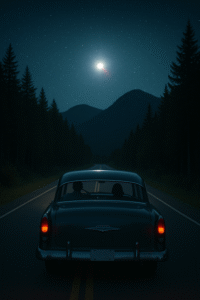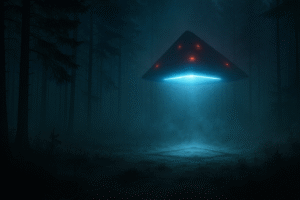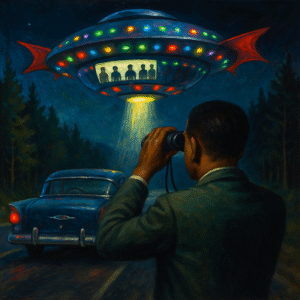Editors Note: The following story is a dramatized retelling of the 1961 experience of Betty and Barney Hill, whose alleged encounter in the White Mountains of New Hampshire became the first widely publicized alien abduction case. While dialogue and atmosphere have been enhanced for narrative effect, all key details — including the strange buzzing sounds, torn clothing, pink powder residue, and star map reference — are drawn from verified reports, hypnosis transcripts, and Project Blue Book documentation. The Hill case remains one of the most examined and controversial UFO incidents ever recorded, standing as a pivotal moment in shaping modern beliefs about extraterrestrial contact.
The road home stretched long and empty, a dark ribbon cutting through the White Mountains. We’d left Montreal that morning, heading back to Portsmouth. It was just after ten when we passed Colebrook — 178 miles to go. Barney drove with that quiet focus of his, the hum of the Chevy filling the silence between us.
I glanced at the dashboard clock. “If we don’t stop, we’ll be home by two,” I said.
Barney smiled, eyes on the road. “That’s if you stop pointing out every moose-shaped shadow.”
“Maybe I just want you to slow down,” I teased. “You drive like you’re in the Indy 500.”
He laughed — low and tired — and reached over to squeeze my hand. We’d been married long enough to know that kind of laugh meant, we’re nearly done here.
Outside, the mountains loomed black against a sky so clear it looked endless. That’s when I noticed it — a bright point of light moving under the moon.
“Barney,” I said, leaning forward. “That star’s moving funny.”
He squinted. “Probably a plane. Or a satellite.”
“It’s too low,” I said. “And it’s zigzagging.”
He didn’t answer. I kept watching. Whatever it was, it wasn’t flying in any straight line. It darted, then hovered, then shot upward — all in total silence.
“Pull over,” I said. “Just for a second.”
We stopped by a picnic area. I reached into my bag and pulled out the binoculars. Through the lenses, the ‘star’ wasn’t a star at all — it was an object. Metallic. Saucer-shaped, almost — but flattened, glowing with rings of coloured light that shimmered as it turned.
I handed the binoculars to Barney. “It’s not a plane. Look.”
He adjusted the focus. “It’s… strange. Looks like it’s pacing us.”
When he said that word — pacing — my stomach dropped.
We drove on, quiet now, through the winding roads of Franconia Notch. The light stayed with us, dipping behind the trees and reappearing again ahead. As we reached Indian Head, it dropped lower — closer — until it seemed to float no more than a hundred feet above the car.
Barney braked hard. “That’s it. I’m getting out.”
He grabbed the binoculars and stepped into the road, the mountain air cutting cold and sharp. I stayed in the passenger seat, gripping the door handle. He walked a few yards ahead, tilted his head back, and froze.
“Barney?” I called. “What do you see?”
He didn’t answer. Then, his voice came back — low and shaking. “There’s people in there, Betty. Standing by the windows. They’re watching me.”
The next thing I remember was the sound — a deep, metallic buzzing, vibrating through the car. The air felt heavy, like the whole world had slowed down. Barney turned and sprinted back, shouting, “They’re coming down!”
He threw the car into gear, tyres spitting gravel. We didn’t speak. I remember the curve of the road, the forest flashing by, the second round of buzzing sounds — and then… nothing.
When I came to, the sky was lighter. The clock said nearly dawn. We were pulling into our driveway in Portsmouth.
Barney looked dazed. “I can’t remember the last fifty miles,” he muttered.
Neither could I.
Inside, everything felt wrong — dreamlike. My dress was torn at the hem and along the zipper. Barney’s shoes were scraped at the toes. The binocular strap was broken. We both felt filthy, though there was no dirt on us. We showered separately and said very little.
Later, I hung my dress outside. That’s when I saw it — pink dust, fine as chalk, clinging to the fabric. When the wind blew it away, the material underneath stayed discoloured, like something had burned it.
That night, the dreams started.
In the dream — or whatever it was — I stood on the road again, surrounded by light. It wasn’t headlights or moonlight. It came from above. My feet moved without resistance, as if drawn forward. Barney was beside me, silent, eyes glazed. We were guided toward a door in the side of the craft, smooth and seamless, like metal that had learned to breathe.
Inside, it was bright — not blinding, but clinical. I was calm, too calm. They were small, maybe five feet tall, with large, dark eyes that seemed to reach into my thoughts rather than look at me. One stood closer — the one I later called “the leader.” His voice wasn’t heard but felt, like thought pressed into thought.
“Don’t be afraid. We need to examine you.”
I wanted to resist, but I couldn’t. They took samples — hair, skin — and seemed curious about my clothes. One brushed my sleeve and scraped some of the powder from it into a small tray.
When it was nearly over, I found my voice. “Where do you come from?”
The leader turned to a wall, or maybe a screen, where stars glowed like pinpricks of fire. He gestured — a cluster of lines connecting points of light. “This is where we’re from. This is where you are.”
I stared at the pattern. None of it looked familiar. “I don’t know those stars.”
He seemed amused. “You will one day.”
Then came that sound again — the low hum — and everything faded. When I woke, I was sitting in the car, Barney gripping the wheel, headlights cutting through the dawn mist.
Days later, when we tried to talk about it, Barney said, “It’s better if we don’t tell anyone.” But we both knew something had happened.
The circles on the car trunk still made the compass spin. My dress never looked right again, even after washing. And sometimes, when I closed my eyes, I could still hear the hum — and feel their eyes, calm and curious, somewhere far above New Hampshire.


